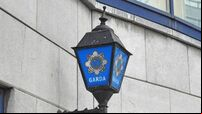Budget 2025: Cork businesses have anxious wait on s

Michael O'Donovan looking into the snug at The Castle Inn on South Main street. Picture: Eddie O'Hare.


The hospitality industry has put pressure on the government to deliver a business-friendly budget that will the industry and prevent further closures.
Cork has lost some well-known and popular pubs and restaurants in recent years and employers within the industry have warned that s such as lower Vat rates and a reduction of the excise duty on alcohol is needed to prevent further closures.
Speaking to The Echo ahead of next Tuesday’s budget announcement, president-elect of the Vintners Federation of Ireland (VFI) and owner of the Castle Inn in the city centre, Michael O'Donovan said it is inevitable that more businesses within the industry will close their doors if the government does not listen to their needs.
“If businesses are running with a 1% margin of profit and if their turnover falls any bit, they’re in big trouble. It has come down a bit, but electricity and gas prices are still at an all-time high. So, we’re at the mercy of a lot of companies and those costs are much higher than what they were five or six years ago for our utilities and if there’s any change in them it puts extra pressures on businesses,” he said.
“It’s inevitable that if the government doesn't the industry in this budget, we will see more closures.” Mr O’Donovan said that there will be a knock-on effect if the hospitality sector is not ed going forward.
“We’ve seen lots of bars closing Monday to Wednesday or a day or two out of those days and people are less inclined to go out on those days but for people working shift work, that might be their weekend on a Monday and Tuesday.
“We have to be conscious that it's the big wheel of . We’re all here to work together and it's our economy that makes our country a strong and attractive place but if we start losing one piece of our economy in the hospitality sector, it won't be long before others find it difficult to come here.” Setting out what the industry is calling for in the budget, Mr O’Donvan said a reduction of the excise duty on alcohol, a reduction on Vat for food only, and wage increases need to be looked at.
“Firstly, it would be to reduce the excise duty on alcohol. We are the second highest in Europe. We’re asking the Minister for Finance to reduce it by 15% over two years. So that’s 7.5% this year and 7.5% next year. We contribute a lot of money to the exchequer in Vat receipts and excise so this would cost just over €90 million a year to do this so it would be a help for our industry.
“Secondly, would be the Vat rates. The 23% Vat rate that we currently have on all goods and services was always meant to be a temporary measure introduced by Michael Noonan 12 years ago when we were in financial difficulty. Now that the country is running a surplus on our budgets, we should be looking to reduce this Vat rate and it would help everybody in every industry but it would give hospitality, especially those doing alcohol, a huge boost. And the 13.5% Vat on food, we would like to see that reduced back down to 9% for food only.
“One of the big costs that we’ve heard travelling the country and listening to , is the costs that have been put upon us by the government, especially the minimum wage. They’re talking again about increasing it and while we have no issue with an increase, it’s the level of increase that is the hard part.
“The final thing would be employers' PRSI which has been set at a high rate for the last number of years. We would ask them to look at it because it is a direct hit on businesses. When you’re paying your employers’ PRSI and you’re also asked to pay for sick days, it feels like it's double taxation on employing someone.”







 App?
App?


